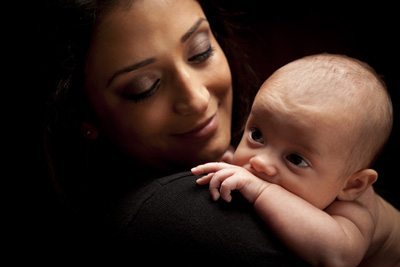‘Roe v. Wade’ Let Me Become a Mother
I found out that I was pregnant nearly 40 years after Roe, but my pregnancy and that case are inextricably linked, even though on paper they have nothing in common.

On January 22, 1973, Roe v. Wade legalized abortion in the United States. On January 22, 2012, I found out that I was pregnant. Those occurrences are inextricably linked for me, even though on paper they have nothing in common.
This was my first pregnancy, and it was one my husband and I had planned for. Our baby developed normally in utero, and my pregnancy was uneventful. None of our darkest fears—that one of us would lose our job, that a routine test would reveal tragic complications, that my own health would be severely affected—came to pass.
Yet, starting with the very date I found out I was pregnant, abortion was on my mind every day for nine months. This was due in part to the fact that the book I had worked on for three years, about the pro-choice movement, sold to a publisher shortly before I became pregnant. I spent the first trimester buried in revisions, had a conversation about abortion with my labor and delivery nurse (who may never again ask a patient, “So, what do you do?”) two hours before giving birth, and reviewed the final galleys while nursing my daughter.
But the other part was more internal, and would have happened regardless of my career. In the months leading up to when I became pregnant, I thought that I was ready to have a child. My husband and I had discussed whether we wanted to become parents, and how, and when, about as much as any couple can. Starting about two years before I actually became pregnant, my husband began taking fewer vacation days so he’d have time saved up “just in case.” And I’d practically taken notes on how several close friends juggled jobs, relationships, and the demands of parenthood.
But the week after the pregnancy test came back positive was marked by an overwhelming sense of being completely unprepared for what was going to happen. Visions of expensive childcare paraphernalia and never sleeping again and losing what ground I had gained in my career haunted my waking and dreaming hours. And those were just the more tangible worries.
Fortunately, my concerns diminished in time. But I was left with a profound sense of gratitude that I had been able to choose not just to become pregnant, but when and with whom. I don’t know if I would have been able to welcome motherhood with such confidence and joy under other circumstances, and I realized that it was due in large part to Roe v. Wade that I could do that.
Ever since Roe, and only since Roe, women and men have been able to plan their lives with the assumption that they won’t become parents until or unless they want to. For me, this has been just as significant as having access to contraception. Like millions of women, having control of all my reproductive choices has meant being able to complete my education, participate fully in the workplace, and establish a solid relationship with my partner before becoming a parent. My reproductive choices influence other parts of my life, and other parts of my life influence my reproductive choices; they are intimately and inextricably connected. And I am hardly alone in this. I don’t know a single person—male or female, parent or not, pro-choice or anti-choice—who does not place great value on making their own family planning decisions.
But too often abortion is talked about as something entirely separate from the rest of the reproductive care continuum, and that isolation has helped perpetuate the myth that abortion is something so rare and repugnant that no rational and compassionate woman would ever choose it. Such a narrow, judgmental conversation does no one any favors, and ignores the positive ways in which the entire spectrum of reproductive rights affects personal lives and helps create healthy families.
I was born four years after Roe v. Wade. I have never had an abortion. And I am grateful to the role that Roe has played in helping me have my own healthy, happy family.
CORRECTION: A version of this article incorrectly noted that Roe v. Wade legalized abortion in the United States on January 23, 1973, when in fact the case was decided on January 22. We regret this error.

